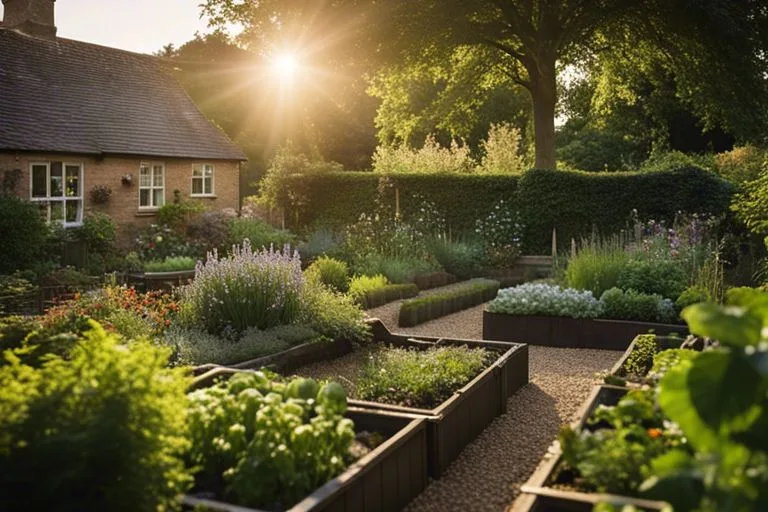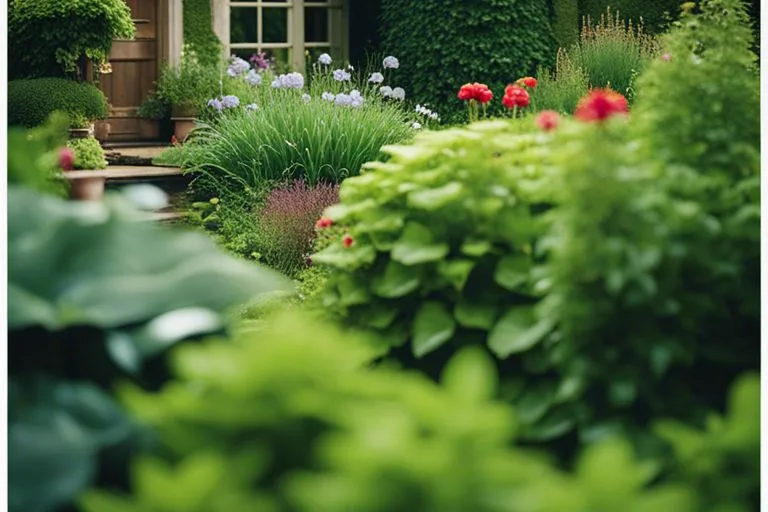It’s crucial to adopt sustainable practices in UK gardening to preserve the beauty of our landscapes for future generations. In this informative blog post, we research into eco-friendly gardening techniques that can help reduce environmental impact while maintaining lush, vibrant gardens. Join us as we uncover insightful tips and strategies to cultivate a more sustainable approach to gardening in the UK.
The State of UK Gardening
Your journey to seek sustainable practices for UK gardening starts by understanding the current state of affairs in the gardening industry. From traditional gardening methods to the growing need for sustainable practices, there are key aspects to consider in order to make informed decisions for your gardening endeavors.
Environmental Impact of Traditional Gardening
To comprehend the impact of traditional gardening on the environment, one must acknowledge the heavy reliance on chemical fertilizers, pesticides, and water consumption. These practices not only harm the soil and surrounding ecosystems but also contribute to pollution and biodiversity loss. It’s imperative to reassess these methodologies and explore alternatives that promote a healthier environment for all.
The Need for Sustainable Practices
The call for sustainable gardening practices in the UK is becoming increasingly imperative as climate change becomes a more pressing concern. Embracing techniques such as organic gardening, water conservation, and native plant cultivation can significantly reduce the carbon footprint of gardening activities. By adopting these sustainable practices, gardeners can play a vital role in nurturing the environment for future generations.
Another crucial aspect to consider when implementing sustainable gardening practices is the long-term benefits they offer. Not only do these methods help preserve natural resources and promote biodiversity, but they also create a harmonious ecosystem that supports a thriving garden environment. By prioritizing sustainability in gardening practices, individuals can contribute to a healthier planet and enjoy the beauty of a truly sustainable garden.
Benefits of Sustainable Gardening
While Sustainability and climate change: a strategy for the education and children’s services systems are at the forefront of global discussions, incorporating sustainable gardening practices can have numerous benefits that go beyond just environmental conservation.
Environmental Advantages
Environmental sustainability is a critical aspect of sustainable gardening. By implementing eco-friendly techniques such as composting, water conservation, and native plant cultivation, gardeners can significantly reduce their carbon footprint and contribute to biodiversity conservation. Sustainable gardening also helps in preserving natural resources, reducing pollution, and creating healthy habitats for wildlife.
Economic Benefits
Benefits economic sustainability by reducing overall costs associated with gardening. This can be seen through decreased water bills when utilizing rainwater harvesting systems, lower expenses on chemical pesticides and fertilizers, and long-term savings due to the durability of sustainable gardening practices. Sustainable gardening can also lead to better land value and increased market appeal for properties.
This approach fosters a self-sustaining system that requires minimal external inputs, leading to savings in the long run. Additionally, the use of organic and locally sourced materials boosts the local economy and supports small businesses within the community.
Health and Well-being Impacts
On top of the environmental and economic benefits, sustainable gardening also positively impacts health and well-being. Engaging in gardening activities can reduce stress, improve mental health, and provide a source of physical exercise. Being in a natural environment enhances overall well-being and can boost mood and productivity.
Health and well-being are deeply interconnected with nature, and sustainable gardening provides a direct link to the earth, fostering a sense of connection and mindfulness. The act of nurturing plants and watching them grow can be therapeutic and rewarding, contributing to a balanced and healthy lifestyle.
Key Principles of Sustainable Gardening
Now let’s explore into the key principles of sustainable gardening that can help you maintain an eco-friendly garden in the UK.
Soil Conservation and Management
For soil conservation and management in your garden, consider implementing practices such as mulching, composting, and crop rotation. Mulching helps to retain moisture in the soil, reduce erosion, and suppress weeds. Composting not only recycles organic kitchen and garden waste but also enriches the soil with vital nutrients. Crop rotation can help prevent soil depletion and reduce the risk of pest and disease build-up.
Water Conservation Techniques
Any sustainable garden should prioritize water conservation. Techniques such as rainwater harvesting, drip irrigation, and selecting drought-resistant plants can help reduce water wastage and maintain a healthy water balance in your garden. Rainwater harvesting involves collecting rainwater in barrels or tanks for later use in watering your plants. Drip irrigation delivers water directly to the roots of plants, minimizing evaporation and runoff.
Additionally, incorporating water-saving features like permeable paving and water-efficient fixtures in your outdoor space can further contribute to water conservation efforts.
Biodiversity and Ecosystem Services
Soil biodiversity plays a crucial role in maintaining a healthy garden ecosystem. By fostering biodiversity through planting a variety of flowers, shrubs, and trees, you can attract beneficial insects, birds, and other wildlife that help control pests and pollinate plants. Creating habitat areas such as bird boxes, bee hotels, and wildlife ponds can further enhance biodiversity in your garden.
One vital aspect of sustainable gardening is recognizing the interconnectedness of all living organisms within an ecosystem. By promoting biodiversity and ecosystem services, you can create a harmonious environment that thrives on the principles of mutual support and coexistence.
Sustainable Gardening Methods
All Supply Chain in Salt Lake City: The Future of Garden Retail enthusiasts should consider sustainable gardening methods to contribute positively to the environment and promote healthier ecosystems. Implementing sustainable practices not only benefits the planet but also creates a more resilient and self-sustaining garden in the long run.
Organic Gardening Practices
The practice of organic gardening involves avoiding synthetic chemicals and pesticides in favor of natural solutions to nurture plants. By using compost, mulch, and natural pest control methods, gardeners can create a thriving ecosystem that supports plant growth and helps maintain soil health.
Permaculture Principles
Permaculture is a design system that integrates sustainable agricultural practices, ecological principles, and community ethics. By following permaculture principles such as observing and interacting with nature, capturing and storing energy, and valuing renewable resources, gardeners can create productive and harmonious garden ecosystems.
Practices such as companion planting, water harvesting, and creating biodiverse habitats are important components of permaculture gardening. By mimicking natural ecosystems and working with the land rather than against it, gardeners can enhance biodiversity, conserve resources, and minimize waste.
Biodynamic Gardening Approach
Sustainable gardening enthusiasts seeking a holistic approach may be interested in biodynamic gardening. This method views the garden as a self-sustaining organism and aims to create a closed-loop system where all inputs and outputs are balanced. By following biodynamic practices such as using biodynamic preparations and following a planting calendar based on lunar cycles, gardeners can enhance soil fertility and promote plant resilience.
Gardening in alignment with biodynamic principles allows for a deeper connection to the natural rhythms of the earth and fosters a sense of stewardship for the land. By treating the garden as a whole, interconnected system, biodynamic gardeners can create thriving and sustainable landscapes that benefit both people and the planet.
Effective Tools and Resources
Eco-Friendly Gardening Equipment
Not all gardening equipment is created equal when it comes to sustainability. Look for tools made from recycled materials or those that have minimal environmental impact during production. Consider investing in hand tools that require less energy and produce fewer emissions compared to power tools. Additionally, opting for durable, high-quality tools can prevent frequent replacements, reducing waste in the long run.
Sustainable Gardening Apps and Software
An important part of modern gardening practices, sustainable gardening apps and software can help you plan, track, and manage your garden with eco-friendly principles in mind. These tools often provide guidance on water conservation, organic pest control, companion planting, and more. Some apps even offer personalized recommendations based on your location, soil type, and plant preferences, making sustainable gardening more accessible and efficient.
Gardening apps and software can also assist in monitoring and reducing environmental impacts by tracking water usage, fertilizer application, and overall garden health. By utilizing these digital resources, you can streamline your sustainability efforts and make data-driven decisions to enhance your eco-friendly practices.
Online Communities and Forums
Resources for UK gardeners extend beyond tools and software to online communities and forums where enthusiasts can share knowledge, tips, and experiences. Engaging with like-minded individuals in these platforms can offer valuable insights on sustainable practices, seasonal gardening advice, and eco-conscious gardening trends. Joining these communities can provide a sense of belonging and support as you navigate your sustainable gardening journey.
For instance, participating in online forums specific to organic gardening or permaculture can connect you with experts and fellow gardeners who are passionate about sustainable approaches. These platforms serve as excellent spaces to ask questions, exchange ideas, and learn from the collective wisdom of the gardening community.
Overcoming Challenges and Barriers
Common Obstacles to Sustainable Gardening
Common challenges in sustainable gardening include lack of awareness about eco-friendly practices, limited access to sustainable gardening materials, and concerns over the initial costs associated with transitioning to sustainable methods. According to Consumers Are the Key to Taking Green Mainstream, educating consumers about the benefits of sustainable gardening is crucial to driving widespread adoption.
Strategies for Success
An effective strategy for overcoming barriers to sustainable gardening is to provide accessible resources and information to gardeners. By offering workshops, online guides, and partnerships with local sustainable gardening suppliers, enthusiasts can learn about practical solutions and cost-effective alternatives to traditional practices.
Encouraging Community Engagement
Understanding the importance of community involvement in sustainable gardening is imperative for creating a lasting impact. By organizing community gardens, shared resources, and educational events, individuals can come together to promote environmental stewardship and create a sense of belonging within their neighborhoods.
To wrap up
The exploration of sustainable gardening practices in the UK has revealed insightful tips and strategies for environmentally conscious gardeners. From water conservation to organic pest control methods, this article has shed light on how individuals can make a positive impact on the planet through their gardening practices. By incorporating these sustainable techniques into their gardening routines, enthusiasts can contribute to a greener and healthier environment for future generations.
The quest for sustainable gardening practices is an ongoing journey that requires dedication and mindfulness. As we strive to cultivate our gardens in harmony with nature, let us remember the importance of taking care of the earth and all its inhabitants. By exploring and implementing the insights shared in this article, gardeners in the UK can play a significant role in fostering a more sustainable future for our planet. Let us nurture our gardens with care and consideration, knowing that each small step towards sustainability makes a difference in the greater scheme of things.




